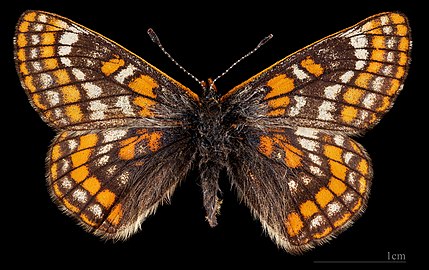
Melanargia galathea, the marbled white, is a medium-sized butterfly in the family Nymphalidae. Despite its common name and appearance, this butterfly is one of the "browns", of the subfamily Satyrinae.

Melitaea diamina, the false heath fritillary, is a butterfly of the family Nymphalidae.

The scarce fritillary is a species of butterfly in the family Nymphalidae. It is found in Austria, Bulgaria, Czech Republic, Finland, France, Germany, Greece, Hungary, Kazakhstan, Lithuania, Luxembourg, Poland, Romania, Russia, Serbia and Montenegro, and Sweden. and East across the Palearctic to Mongolia.

Scolitantides orion, the chequered blue, is a species of butterfly in the family Lycaenidae. It is found in Europe, Russia and east across the Palearctic to Japan.
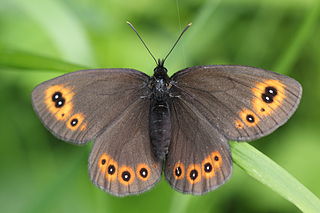
Erebia medusa, the woodland ringlet, is a member of the subfamily Satyrinae of the family Nymphalidae.

The Lapland ringlet is a member of the subfamily Satyrinae of the family Nymphalidae. It is restricted to sunny patches in very damp spruce and pine forests and forested unmanaged peatlands. The larva feeds on various grasses and related plants and winters twice. A dry period in the habitat will result in the decline of the species.
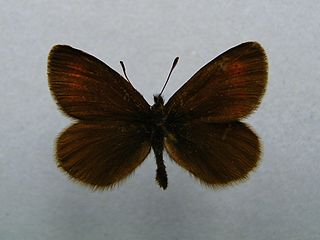
The Eriphyle ringlet is a member of the subfamily Satyrinae of family Nymphalidae. It is a high mountain butterfly found in the Alps.Wheeler (1903) gives a short description

Boloria dia, the Weaver's fritillary or violet fritillary, is a butterfly in the family Nymphalidae. The name Weaver's fritillary is in honor of Richard Weaver, an English insect collector who claimed to have obtained the specimen within ten miles of Birmingham around 1820. However, B. dia is very rare in England and the few specimens known from there are thought to be from possibly accidental introductions.
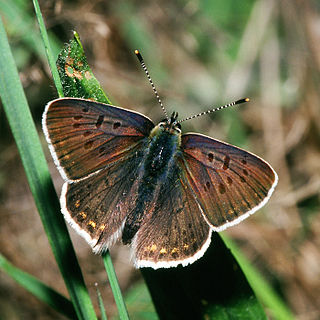
Lycaena tityrus, the sooty copper, is a butterfly of the family Lycaenidae. It is found in Europe.

Euphydryas cynthia, or Cynthia's fritillary, is a butterfly of the family Nymphalidae. It is found in the Alps and in mountainous areas of Bulgaria in alpine meadows from 400 to 2,300 meters.

Erebia pandrose, the dewy ringlet, is a member of the subfamily Satyrinae of the family Nymphalidae. It is found from the Arctic areas of northern Europe, the Pyrenees, Alps, the Apennine Mountains, the Carpathian Mountains, Kola Peninsula and Kanin Peninsula, part of the Ural and the Altai and Sayan Mountains up to Mongolia.

Muschampia tessellum, the tessellated skipper, is a butterfly of the family Hesperiidae. It is found from the southern Balkan Peninsula through Ukraine, southern Russia and Asia Minor, southern Siberia, Mongolia, east to the Amur region.

Erebia melampus, the lesser mountain ringlet, is a member of the subfamily Satyrinae of the family Nymphalidae.

Melanargia russiae, or Esper's marbled white, is a butterfly in the family Nymphalidae. It is found in Spain, Portugal, south-eastern France, Italy, the Balkans, southern Russia, the Caucasus and western Siberia.

The twin-spot fritillary is a butterfly in the family Nymphalidae.
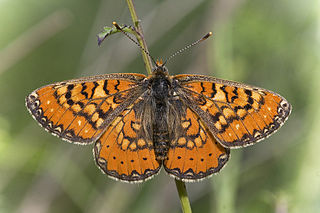
Euphydryas desfontainii, the Spanish fritillary, is a species of butterfly in the family Nymphalidae. It is found in France, Portugal, Spain, Morocco and western Algeria in North Africa.
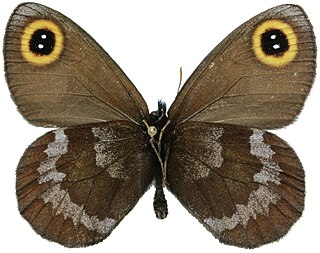
Erebia cyclopius is a species of butterfly of the subfamily Satyrinae in the family Nymphalidae. It is found through Siberia, northern Mongolia, northern China and North Korea. The habitat consists of forest edges, flowery meadows and sparse larch forests.

Chazara persephone, the dark rockbrown, is a butterfly species belonging to the family Nymphalidae. It can be found from Crimea across the Caucasus and north of the Middle East to Iran; from the southern Urals across Kazakhstan to the southern Altai and west Siberia.

Euphydryas intermedia synonym ichnea is a small butterfly found in the Palearctic that belongs to the browns family. It occurs up to 2200 m above sea level.

Boloria oscarus is a small butterfly found in the East Palearctic that belongs to the browns family.

